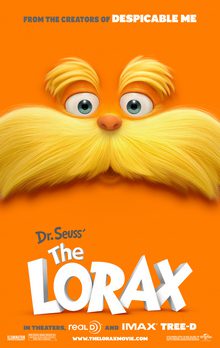Why did we choose The Lorax to show at this year’s Wanstead Kinema? We have always chosen films which appeal to children (while amusing parents), but we have generally shown films which have recently been on general release. The Lorax does not fall into this category – it was released in 2012 – but we have been quite deliberate about our choice.

The book was published 50 years ago this year, in 1971 – nearly 15 years after Dr Seuss’s two best-known works, The Cat in the Hat and How the Grinch Stole Christmas. And while the text has some of the Jabberwocky-style lingo (“Grickle-grass”) and fantastical make-believe, it is an altogether darker book than you normally expect of Dr Seuss.
Theodor Seuss Geisel said of the book: “The Lorax came out of me being angry. In The Lorax I was out to attack what I think are evil things and let the chips fall where they might.” That anger comes through – and the result is hardly a warming read.
The tale is of a boy who stumbles on a wasteland, and persuades a character in a tower – the Once-ler – to tell him the legend of the Lorax. The Once-ler tells him that when he arrived in the area as a young man it was a paradise with beautiful Truffula trees, swans, fish and bear-like creatures called Barbaloots. The ambitious Once-ler cut down one of the trees to use its fronds to make a “thneed”, a ridiculously versatile creation which would be useful nowadays as a face-mask. His business grows, and despite the warnings of the Lorax, a little orange creature with a big yellow moustache who “speaks for the trees”, he eventually cuts them all down, leading to the departure of all the creatures and eventually the Lorax himself. The Once-ler passes on a stark warning to the boy: UNLESS someone like you cares a whole awful lot, nothing is going to get better. It’s not.
In some ways it clearly comes out of 1960s environmentalism, but with the damage which has been done to the forests, oceans and atmosphere in the past 50 years, only a fool would say the warnings were misguided.
Enter the 2012 film, made by the same French studio responsible for Despicable Me (incidentally, Despicable Me 2 was the first film we showed at the Kinema, also at Overton Drive). While reviewers were somewhat lukewarm – perhaps their tastes had been spoilt by the new golden age of animation? – we believe the film now looks something like a modern classic.
For while the characteristic Seuss text is largely absent, the story is nevertheless powerful with vivid characterisations. Centring on the boy and his growing sense of responsibility, it brings the book’s message alive – no longer just a bleak “unless…” but now something more likely to inspire the generations which look up to Greta Thunberg. There are extra layers – ambition gone wrong, the perils of trying to live up to family expectations, the mind-tricks of commerce and marketing, and even people’s susceptibility to propaganda. It’s a musical too, with a fantastic score by English composer John Powell.
So if as a result of seeing the film here at the Kinema one child plants one seed, then the film will have done good.
Giles Wilson

